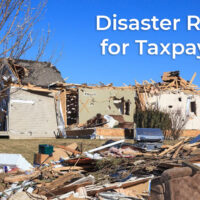
While natural disasters bring adversity, they also reveal the best in people, often through their resilience and generosity. Sadly, natural disasters can also bring out the worst in some unscrupulous people who prey upon the generosity of Americans. The IRS has reminded taxpayers about the scammers who not only want to steal the money of generous Americans but are also looking to steal their identities. In a recent IRS News Release, IR-2024-269, the agency warns that scammers may be taking advantage of Americans’ generosity in the wake of Hurricanes Helene and Milton.
Storm Surge of Fake Charities
The scammers set up fake charities to cover their illicit collection of money and taxpayers’ personally identifiable information (PII), such as names, addresses, and social security numbers, from generous taxpayers. They attempt to do this during phone calls by pressuring victims to give immediately. In IRS News Release IR-2024-269, IRS Commissioner Danny Werfel advises, “[y]ou should never feel pressured by solicitors to give to a charity immediately. It’s important to do the research and verify if they’re authentic first.”
Due Diligence for Disaster Donations
An important tool in the “due diligence” for generosity is the IRS’s Tax-Exempt Organization Search (TEOS) tool. Americans interested in contributing to hurricane relief can easily verify that a charity is legitimate and recognized as eligible for tax-deductible contributions. A determination letter should be available through a quick search that states under which section of the Code an organization is exempt. The letter normally shows the organization’s address and may provide clues indicating the entity’s legal status.
Tips to Avoid Contributions to Fake Charities
IRS News Release IR-2024-69 offers the following tips to spot scammers and avoid contributions to fake charities.
Always verify
Even though a telephone solicitor may use the name of a well-known organization, they may be altering their identity or website to mimic a legitimate charity. After all, if they’re willing to steal an individual’s social security number, they’re probably willing to steal another organization’s intellectual property. The IRS’s TEOS tool can help avoid donating to a scammer.
Be alert about how a telephone solicitor requires a donation
Those who solicit donations requesting payment by gift card or wiring funds are likely part of a scam. After verifying a charity’s legitimacy, the IRS advises it is safer to contribute via credit card or check.
Limit information that is shared
Charitable contributions do not require social security numbers, so a telephone solicitor who requests one should be immediately suspected.
Resist pressure
Some solicitors use extreme pressure to coerce their victims to release their money and their PII. Legitimate charities do not do this, as they attempt to build long-term relationships with their donors. Pressure to give should raise an immediate red flag.
The Tax Professionals’ Role
Tax professionals serve their clients well by alerting them to dangers that could result in the theft of their PII. When the needs are pressing, as with hurricane relief currently, it’s tempting to press forward and take rapid action. Unfortunately, this can have long-term consequences if the clients’ money is stolen or their PII is compromised.
Tax professionals serve their clients well by alerting them of the need to verify an organization’s tax status and address. In a blog or a regular newsletter, a few tips on how to accomplish this quickly with the IRS’s TEOS tool may save a client from becoming a scam victim. If a client frequently donates to unfamiliar organizations, consider reaching out to discuss their charitable giving. This attention to client needs is another way to demonstrate the value of professional tax services.
By John W. Richmann, EA, MBA
Tax Materials Specialist, U of I Tax School

Sources:



